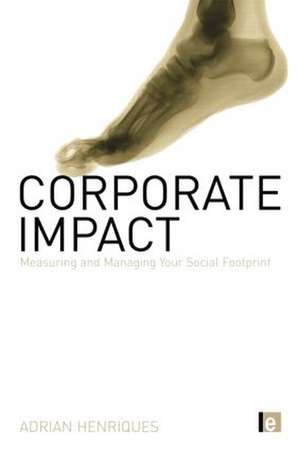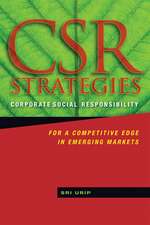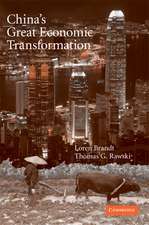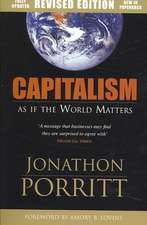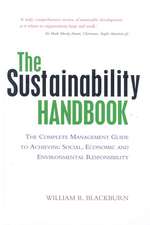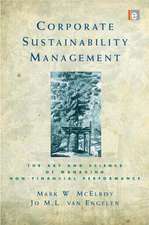Corporate Impact: Measuring and Managing Your Social Footprint
Autor Adrian Henriquesen Limba Engleză Paperback – 9 dec 2015
| Toate formatele și edițiile | Preț | Express |
|---|---|---|
| Paperback (1) | 410.50 lei 6-8 săpt. | |
| Taylor & Francis – 9 dec 2015 | 410.50 lei 6-8 săpt. | |
| Hardback (1) | 1001.87 lei 6-8 săpt. | |
| Taylor & Francis – 24 mar 2010 | 1001.87 lei 6-8 săpt. |
Preț: 410.50 lei
Nou
Puncte Express: 616
Preț estimativ în valută:
78.55€ • 82.23$ • 64.99£
78.55€ • 82.23$ • 64.99£
Carte tipărită la comandă
Livrare economică 05-19 aprilie
Preluare comenzi: 021 569.72.76
Specificații
ISBN-13: 9781138866898
ISBN-10: 113886689X
Pagini: 224
Dimensiuni: 156 x 234 x 12 mm
Greutate: 0.32 kg
Ediția:1
Editura: Taylor & Francis
Colecția Routledge
Locul publicării:Oxford, United Kingdom
ISBN-10: 113886689X
Pagini: 224
Dimensiuni: 156 x 234 x 12 mm
Greutate: 0.32 kg
Ediția:1
Editura: Taylor & Francis
Colecția Routledge
Locul publicării:Oxford, United Kingdom
Public țintă
Professional Practice & DevelopmentCuprins
1. Introduction2. The Social Purpose of Companies3. Complicity and the Sexual Exploitation of Children - a case study4. Sustainability's Social Side5. Thinking like a Stakeholder6. The Voice of the Stakeholder7. Sociological Impacts8. Signs of Impact9. Reporting Social Impact10. Measuring Economic Impact11. Investing in Impact12. Social Footprint13. Accounting for Social Impact14. The Elusiveness of the Social RevisitedAppendix I - Market ResearchAppendix II - Analysis of GRI Social IndicatorsAppendix III - SROI Case StudyBibliography
Notă biografică
Adrian Henriques is an independent adviser, writer, researcher, teacher and campaigner on corporate responsibility, social accountability and sustainability. He is professor of Accountability and Corporate Social Responsibility at Middlesex University, and the author of Corporate Truth: The Limits to Transparency (Earthscan, 2007).
Recenzii
'Adrian Henriques has done it again ... Clear and well-written, the text will stimulate and challenge practitioners, students, policy-makers and academics.'Professor R.H. Gray, Director of The Centre for Social and Environmental Accounting Research, School of Management, The Gateway University of St Andrews'There may be a temptation to blame the corporate sector for many of the world's problems, but ultimately it's a split of responsibility between the life style choices of individual consumers, the state and the corporation. To address this subject Adrian Henriques reviews an array of methods to try and measure the social outcome of individual companies in an attempt to answer the frequently asked question 'What's a company for?''Dr Chris Tuppen, BT Director of Sustainable Development'In developing policy and standards for business activity, social impact has long been the disadvantaged sibling of environmental and economic impacts of companies. Henriques goes a long way toward rectifying this disparity by providing rich and varied perspectives on the definition, measurement and assessment of the social footprint of commercial activity Along the way, he takes us well beyond the boundaries of conventional CSR, raises fundamental questions about the purpose of the corporation, and challenges both companies and stakeholders to rethink their interdependency in new and provocative ways.'Allen L. White, Co-Founder, Global Reporting Initiative; Senior Fellow, Tellus Institute'Adrian Henriques has done it again. He has taken a refreshingly novel angle on an important issue in need of urgent attention. This much-needed attempt to move on from much of the staleness in the CSR debate is broad and wide-ranging. Clear and well-written, the text will stimulate and challenge practitioners, students, policy-makers and academics. My guess is that my personal reaction of positive response and outraged disagreement in roughly equal measure will be a fairly common one: in this regard it succeeds masterfully in advancing this debate in a challenging manner.'Professor R.H. Gray, Director of The Centre for Social and Environmental Accounting Research, School of Management, The Gateway University of St Andrews'As we cannot stretch the surface of the planet, we cannot extend time. Space and time are the ultimate physical ingredients to anything we do. Measuring, therefore, our time footprint (or social footprint) becomes a key ingredient for any sustainability assessment, and I am thrilled that Adrian Henriques is exploring the time dimension as a metric for social impact.'Mathis Wackernagel, Global Footprint Network President
